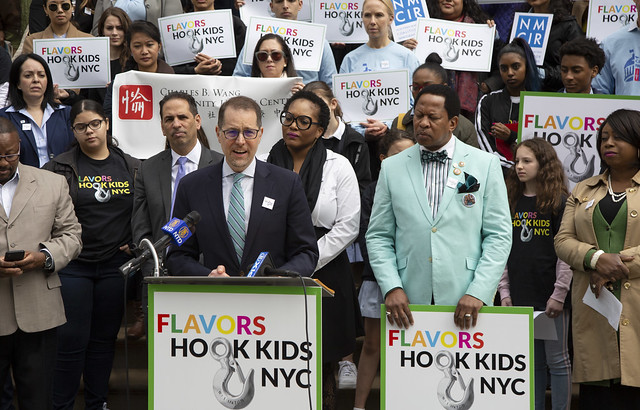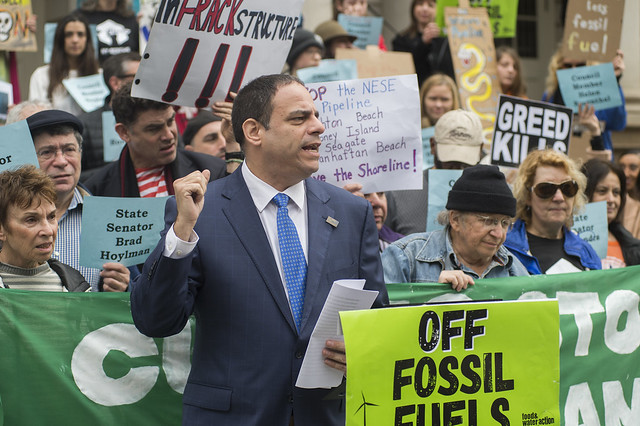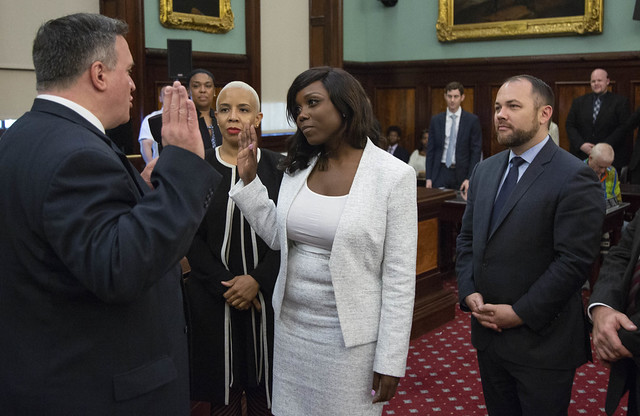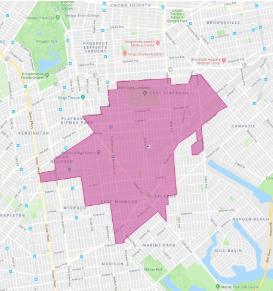NAACP, Anti-Smoking Groups Press City Council Speaker on Bills Banning Flavored Cigarettes

Council Members Levine, center, & Cabrera, behind him (photo: John McCarten/City Council)
The New York chapter of the NAACP and four of the nation’s largest anti-smoking groups are urging City Council Speaker Corey Johnson to support two bills that would effectively ban the sale of flavored tobacco products in New York City. The groups recently sent a letter urging Speaker Johnson to bring the two proposals up for a vote in the City Council.
The first bill, Intro. 1345, sponsored by Bronx Council Member Fernando Cabrera, would end an exemption in a previous city law that banned the sale of flavored cigarettes to allow for the continued sale of menthol, mint, and wintergreen flavors.
The second bill, Intro. 1362, sponsored by Manhattan Council Member Mark Levine, who chairs the Council’s Health Committee, would ban the sale of flavored e-cigarettes.
The American Heart Association, Campaign for Tobacco-Free Kids, American Lung Association, and American Cancer Society joined the NAACP’s New York State Conference in calling for flavored tobacco products to be banned in New York City. They say the tobacco industry uses flavored products to specifically target young people and communities of color.
“We strongly urge you to enact two proposals pending before the Council – both cracking down on flavored tobacco products that lure and addict our children,” reads the letter.
The letter states that 85% of African-American smokers use flavored productions (compared to 29% of white smokers). These organizations believe this is a leading reason why “African Americans suffer the greatest burden of tobacco-related mortality of any racial or ethnic group in the United States.”
Last year, youth e-cigarette use, which increased 80% in 2018, was declared an “epidemic” by the U.S. Surgeon General. The advocacy groups’ letter points to a survey that found that “81.5% of youth e-cigarette users and 73.8 percent of youth cigar users saying they used the product ‘because they come in flavors I like.’”
The letter calls these trends “simply unacceptable” and implores Speaker Johnson to act on the issue. Both bills were first introduced in January and hearings were held in that same month, but there has been no change in the legislation’s status for five months, save additional sponsors signing on.
In May, all five borough presidents signed on to a letter drafted by Brooklyn Borough President Eric Adams supporting the two bills. Both Adams, who has made public health a signature issue, and Bronx Borough President Ruben Diaz Jr. are considering runs for mayor, as is Johnson, who has also had a focus on health and chaired the Council’s health committee last term.
Johnson has been waging a public battle to quit smoking cigarettes, recently tweeting that he had hit 40 days without one (he told Gothamist he bought a juul, but did not indicate if it is flavored).
“The Council is always working to improve the public health outcomes of all New Yorkers, and we are continuing to review these proposals as they go through the legislative process,” according to a spokesperson for Johnson, who did not indicate where the speaker himself falls on the bills.
Neither bill has a majority of sponsors in the Council.
Eighteen of 51 Council members have sponsored Cabrera’s bill. “Flavored tobacco leads to the preventable deaths of thousands of New Yorkers each year and it is people of color and our children who are most at risk of getting hooked,” Cabrera said in a statement to Gotham Gazette. “We must move quickly to significantly restrict menthol cigarettes and flavored cigarettes in our city.”
Fourteen Council members have sponsored Levine’s bill. Twelve of the 14 also sponsor Cabrera’s bill. “To protect kids and our communities, we have to end the sale of flavored tobacco products in New York,” Levine said in a statement, adding that he is “working hard in the City Council to pass legislation to ban these products and ensure they can no longer be used to addict the most vulnerable New Yorkers.”
Some anti-tobacco advocates have posited that the bills haven’t moved because the National Action Network, a civil rights organization led by Rev. Al Sharpton, has come out against Cabrera’s proposal.
During the Council health committee hearing on the bills in January, Kyra Stephenson-Valley, NAN’s cessation coordinator, said “it is proven that increased regulation does not necessarily stop users, but rather criminalizes addicts without resource,” pointing out that there have been “disparate impacts.”
She went further, declaring that “bans and prohibitions can lead to an increase in negative interactions between law enforcement and African-Americans.” She also alluded to Eric Garner’s death, saying “history has shown us here in New York City that can take your life over a loose cigarette.”
In addition to City Council testimony, according to Politico, NAN “has held town halls at prominent black churches throughout the United States to talk about how menthol bans criminalize the black community.” According to a spokesperson for Council Speaker Johnson, Sharpton has mentioned the issue to him in passing, but has not directly lobbied Johnson or the Council.
City Council Member Keith Powers, a Manhattan Democrat who supports Levine’s bill but not Cabrera’s, said in a statement, “I have been an ardent supporter of stricter laws on smoking but want to ensure that no community feels targeted.” He did not respond when asked whether any individual or group personally lobbied him against Intro. 1345.
According to FairWarning, NAN receives funding from R.J. Reynolds, the second-largest tobacco company in America. The company produces Newports, which are the nation’s best-selling menthol cigarette brand. According to FairWarning, R.J. Reynolds’ donations to NAN are part of a broader corporate strategy of “seizing on the hot button issue of police harassment of blacks to counter efforts by public health advocates to restrict menthol sales,” with the help of prominent African-Americna leaders and advocacy groups.
The tobacco industry has a long history of employing similar tactics. According to the CDC, tobacco companies have historically attempted “to maintain a positive image among African Americans have included such efforts as supporting cultural events and making contributions to minority higher education institutions, elected officials, civic and community organizations, and scholarship programs.”
***
by Andrew Millman, Gotham Gazette
@millman_andrew @GothamGazette
De Blasio Administration Doesn't Support Council Bill to Create Department of Sustainability & Climate Change

Council Member Constantinides (photo: Jeff Reed/City Council)
At a recent hearing of the City Council Committee on Environmental Protection, the de Blasio administration expressed its opposition to a bill that would establish a New York City Department of Sustainability and Climate Change.
The bill, Intro. 1399, was introduced in February by Council Member Costa Constantinides, a Queens Democrat and chair of the environmental protection committee.
It would make New York City among the first in the nation to implement a municipal-level agency dedicated to sustainability and climate change, according to Constantinides, and would repeal the Mayor’s Office of Sustainability and replace it with the new department, led by a commissioner. This change, going from part of the mayor’s office to a separate department, would likely mean more funding and staff for the responsibilities involved, signifying greater emphasis on the city’s efforts to fight climate change and prepare for its effects.
The commissioner of a Department of Sustainability and Climate Change would be responsible for all matters pertaining to recovery, resiliency, and sustainability, the three main pillars of the work involved as the city takes additional efforts to deal with and fight climate change. The department would develop and coordinate the implementation of policies, programs, and actions to meet the long-term needs of the city.
The proposed bill would also establish a Sustainability Advisory Board with members to include, at a minimum, “representatives from environmental, environmental justice, planning, architecture, engineering, oceanography, coastal protection, construction, critical infrastructure, labor, business, and academic sectors.” Most members would be appointed by the Mayor though it would also include the Speaker of the City Council and the chair of the Council’s Committee on Environmental Protection or their designees.
“It’s time for us to make as a city a larger investment, a deeper investment, and one that when this mayor leaves, and when this City Council leaves, that we’re leaving behind a stronger apparatus, an apparatus that would be in perpetuity in relation to climate change,” Constantinides said during the hearing.
But Mark Chambers, the director of the Mayor’s Office of Sustainability, testified before the Council committee at the June 12 hearing, which also dealt with two other bills related to reducing methane emissions and leaks in the city, and expressed the de Blasio administration’s opposition to the bill to create a new department.
After highlighting what he deemed the many successful initiatives of the Mayor’s Office of Resiliency, the Mayor’s Office of Sustainability, and the Mayor’s Office of Climate Policy and Programs, Chambers said a new department is not necessary. Key measures and structures are already in place to ensure that resiliency, sustainability, and recovery are embedded in all New York City agencies and initiatives, Chambers argued.
“Climate change is a cross-cutting issue requiring the specialized expertise of almost every city agency. By giving the Mayor’s Office of Sustainability, the Mayor’s Office of Resiliency and the Mayor’s Office of Climate Policy and Programs the power to coordinate agency efforts, we are able to act with the urgency that our residents demand,” Chambers said in his testimony.
“Having said that, while the administration believes that our current climate teams are structured appropriately to meet the challenge, New York City residents need every tool at our disposal in this fight,” he continued. “We share your goals that were put forward in Intro. 1399 to prepare New York City for the impacts of climate change, build a more sustainable city and effectively respond to and recover from climate emergencies. In the coming months, we look forward to discussing strategies for effectively meeting these goals together.”
“I completely agree that doing more is not only advantageous but it’s absolutely necessary. To your original point about the benefits of making sure there is a legacy of this work, making sure that it has to continue, one of the hallmarks of our approach to our climate work is codifying it wherever possible,” Chambers said in his testimony. “So it’s not just working with the Council, it’s also with changing the energy codes, changing the building codes, changing the zoning codes to make sure that it is not subject to just prioritization but it’s become a culture of how we do work internally in the city as well as how the city at large has to redefine our environment.”
Constantinides acknowledged the work that the mayor’s office and the City Council have done to address climate change, its threats and impacts, but said the city needs a single agency to act as a conduit for all resiliency work moving forward. “The men and women of MOS and MOR have done an outstanding job and I want to thank them for that,” he said in his opening statement. “We cannot expect, however, that the several dozen employees in this office have the capacity to manage the sustainability policies for the over 300,000 strong city workforce. We want to give them more help.”
The new department would implement and monitor sustainability initiatives in New York City that have been launched in recent years such as the city’s commitment to an 80% reduction in carbon emissions by 2050 and the city’s initiative to install 1 gigawatt of solar capacity citywide by 2030 -- enough to power 250,000 homes -- among many others. Led by Constantinides, the City Council just passed, with de Blasio’s support, sweeping legislation to mandate major carbon emissions reductions and green upgrades at the city’s largest buildings, and the de Blasio administration is moving ahead not only with continued recovery efforts from 2012’s Hurricane Sandy, but new resiliency efforts like the Lower Manhattan Coastal Resiliency Project.
The proposed bill would also require the commissioner of the Department of Sustainability and Climate Change to present a long-term sustainability plan for the city that would detail interim goals based on planning and sustainability indicators. The city would have to achieve each interim goal by no later than April 22, 2030 and long-term goals no later than April 22, 2050. (April 22 is Earth Day.)
Additionally, the commissioner must prepare and submit to the mayor and the speaker of the City Council an initial report on the city’s performance with respect to the identified sustainability indicators and long-term planning and sustainability efforts no later than April 22, 2020.
At the hearing, Constantinides asked Chambers how a new mayor would affect the Mayor’s Office of Sustainability’s current $17 million budget. “The discretion would still stand with the mayor, whether it’s agency or whether it’s mayoral office,” Chambers responded.
After Chambers and other representatives of the de Blasio administration testified, members of the public appeared before the Council to discuss the bills at hand, raising some questions about the proposed department bill.
“I’m concerned that there do not appear to be any enforcement mechanisms if agencies fail to meet their stated goals,” said Amy Ruther of the New York City chapter of the Democratic Socialists of America. “I’m also concerned that the members of the Sustainability Advisory Board are all appointed, not elected, and they are not required to seek input from the communities that their decisions will impact the most.”
***
by Jewel Antoine, Gotham Gazette
@GothamGazette
Quick Rematch in Second Special Election for Brooklyn City Council Seat

Council Member Farah Louis is sworn in (photo: John McCarten/City Council)
City Council Member Farah Louis was officially sworn in at City Hall on Thursday, a few weeks after winning a crowded special election to succeed Public Advocate Jumaane Williams to represent the Council’s 45 District in Brooklyn. But thanks to New York’s laws for special elections, she is already running for reelection in another special election, with the all-important Democratic primary set for June 25, in which Louis is facing several opponents she outpaced in the May 14 election.
The first special election was to serve through the rest of this calendar year, while the June primary and November general elections will determine who holds the Council seat for 2020 and 2021, the final two years of the four-year term. There will then be an election for the seat as part of the full city election cycle in June and November of 2021.
 The district includes parts of Central Brooklyn including areas of Flatbush, Flatlands, Canarsie, and Midwood.
The district includes parts of Central Brooklyn including areas of Flatbush, Flatlands, Canarsie, and Midwood.
Louis won the May special election with 42% of the vote in an eight-candidate field. Monique Chandler-Waterman finished second with 30%, and is running again in the June 25 primary.
The other six candidates from May – Jovia Radix, Xamayla Rose, L. Rickie Tulloch, Adina Sash, Anthony Alexis, and Victor Jordan – all received under 10% of the vote. Several of the other candidates are also campaigning ahead of the June vote.
All eight candidates who ran in May will appear on the ballot again in June, but only some are actively campaigning, led by Louis, Chandler-Waterman, and Rose.
Louis, now the incumbent, is of course running again, this time with the institutional support of the City Council behind her, including Speaker Corey Johnson. Runner-up Chandler-Waterman is actively campaigning, as is fifth-place finisher Rose, who got 6% of the vote in May. Anthony Alexis has also continued to campaign and raise money, but he received only 1% of the vote in May. Jovia Radix, L. Rickie Tulloch, and Adina Sash have all suspended their campaigns, while last-place finisher Victor Jordan’s plans are unclear.
Four candidates have filed with the Campaign Finance Board to receive public matching funds: Louis, Chandler-Waterman, Rose, and Alexis. As of June 7, only Louis and Chandler-Waterman raised enough to receive matching funds; Rose and Alexis are actively fundraising but have not yet hit the threshold needed to qualify for public funding.
With just a week before primary day, it appears to again be a two-candidate race between Louis, a Judicial Delegate and former aide to now-Public Advocate Williams, and Chandler-Waterman, who continues to have Williams’ endorsement for his old seat. Chandler-Waterman is also a former Williams aide and more recently led East Flatbush Village, a non-profit she founded that aims to eliminate violence through after-school programs and mental health workshops, according to its website.
Though the election has been contentious and closely fought, policy differences among the leading candidates are few and far between. Louis’ and Chandler-Waterman’s websites both lack sections devoted to issue positions; Rose is the only candidate with a clear policy agenda laid out. Most social media and news coverage has instead focused on their differing biographies, resumes, and political supporters.
Differences, when they do emerge, are largely matters of emphasis, though they have expressed different top priorities. In an interview with NY1’s Errol Louis, Farah Louis prioritized zoning and development regulations, “ensur[ing] that the neighborhoods continue to look the way they looked when we first invested into them.”
Chandler-Waterman, in her interview with NY1’s Louis, stressed the need for police reform and mental health initiatives, saying that she does “not believe the NYPD should be responding to any individual that has mental health illnesses.”
For the voters’ guide published by the New York City Campaign Finance Board, Louis listed her top three issues as “preserve and expand affordable housing,” “invest in educational” [sic], and “support economic development and jobs.”
For the CFB guide, Chandler-Waterman listed her top three issues as “affordable housing,” “education,” and “public safety.”
The candidates’ answers to questionnaires from Citizens Union, a good government group, show similar differences. Louis lists housing initiatives as her top two of five main priorities, while Chandler-Waterman’s first two points concern gun violence and public safety.
The questionnaires also illuminate small policy differences between the two candidates relating to voting and City Council reform. Chandler-Waterman supports changes to reduce the number of City Council committees and to require that laws enacted through a referendum can only be changed by voters; Louis opposes both reforms.
For the June 25 election, as of the June 14 filing, Louis raised $42,289 and received $75,308 in public matching funds, while Chandler-Waterman raised $33,555 and received $66,576 in public funds. The two candidates led the field in fundraising ahead of the May special election as well.
Both candidates have significant endorsements in their corner. In addition to Johnson, Louis has been endorsed by Brooklyn Borough President Eric Adams and Assemblymember Rodneyse Bichotte, who represents an overlapping Assembly district, as well as many other City Council members, Assembly members, and 1199 SEIU, the powerful health care workers union that Louis used to belong to and then worked for. Louis also has the backing of the district’s large and powerful Orthodox Jewish community leadership, which endorsed and voted for her over Adina Sash (who is Orthodox Jewish) in May and appears to be fully behind her again this month. On Wednesday, Bklyner reported that Mayor Bill de Blasio and the Hotel Trades Council labor union had both thrown their support behind Louis.
For her part, Chandler-Waterman has Williams’s backing – a point of consternation for Louis, who was until recently his staffer. Williams is continuing to fundraise for Chandler-Waterman. Following her special election loss, Chandler-Waterman appears to have lost the endorsement of City Council Majority Leader Laurie Cumbo, who represents a nearby district (Cumbo’s name has been removed from the endorsements page of Chandler-Waterman’s website). However, she picked up endorsements from the politically-potent property service workers union 32BJ SEIU and former opponent L. Rickie Tulloch, and maintained the support of Assembly Member Nick Perry, State Senator Zellnor Myrie, and other local politicians.
Chandler-Waterman was also endorsed by the City Council Progressive Caucus and the Working Families Party in the first round, indicating that her progressive bona-fides may be stronger than Louis’. The Working Families Party has recently reaffirmed its support for Chandler-Waterman, but the Progressive Caucus appears to have rescinded its for the second special election.
Rose, the third particularly active candidate in the race, is the founder of an anti-violence nonprofit and a member of Community Board 17.
Both Louis and Chandler-Waterman have made and addressed controversial comments recently. Louis apologized for tweets from 2010 which demeaned Jews and the LGBT community; she nonetheless maintained her endorsements from LGBT Democratic clubs and Jewish representatives like Council Member Chaim Deutsch.
Waterman-Chandler, meanwhile, was recorded yelling at NYPD officers outside her child’s school in October of 2018 following an unverified charge against her husband. More recently, in an interview with City & State just after the May 14 election, she accused Louis of winning the special election on the backs of “Trump supporters.” Her claim appears to be supported by voting data; the Midwood precincts where Louis won overwhelmingly, which are mostly Orthodox Jewish, were also the 45th District’s most Trump-friendly in 2016. Louis’ campaign itself did not respond to Chandler-Waterman’s comments, but City Council Member Kalman Yeger, a Louis ally, called them offensive.
While Louis, after winning in May by a large margin and now having at least the buzz of incumbency, is clearly the favorite in the June 25 election, it’s not clear what the electorate may look like and whether Waterman-Chandler is taking any new measures to alter the race this time.
Turnout was incredibly low in the May 14 election – only 9,235 people cast votes out of 94,089 active registered voters in District 45. While the May special election was non-partisan and open to all registered voters in the district, the June vote is a Democratic primary, wherein only registered Democrats in the district can vote. There are no other major races bringing voters to the polls.
Although the 45th Council District is heavily Democratic, the winner of the primary election may not have the ballot to themselves in November. Anthony Beckford, who ran for the same seat in 2017 on the True Freedom line against then-incumbent Jumaane Williams, has said he’s running but has yet to report raising any money. There’s also the chance that Louis or Chandler-Waterman could appear on one or more other ballot lines - like Working Families Party - after the Democratic primary.
***
by Joey Fox, Gotham Gazette
@GothamGazette




